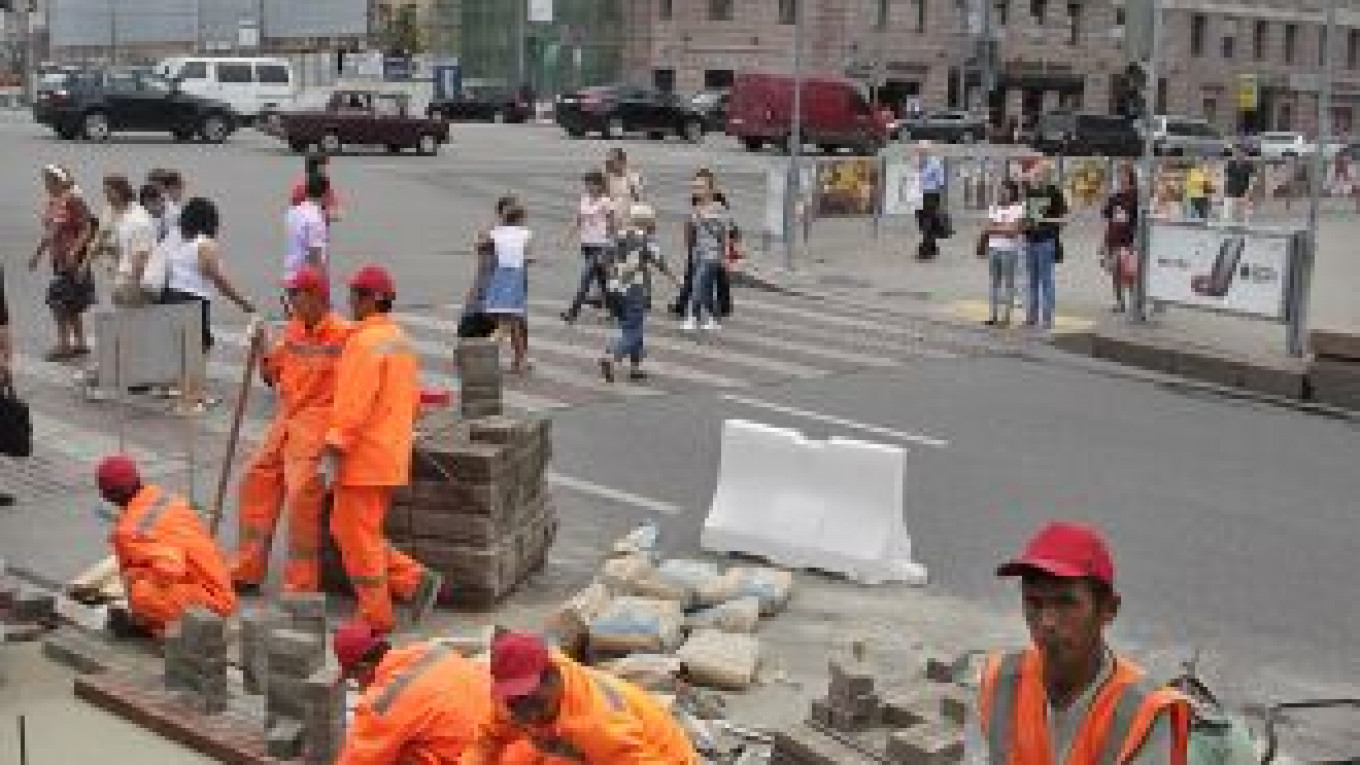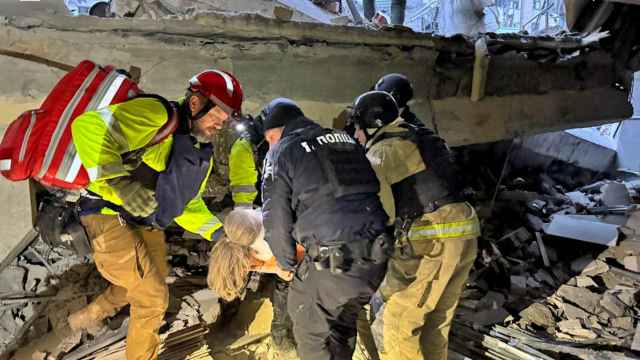If you've walked around downtown Moscow in recent weeks, you most likely got to wander through a maze of brick stacks and roadblocks, all swarming with migrant workers.
Trying to understand why Mayor Sergei Sobyanin decided to replace the asphalt sidewalks with red bricks is almost as confusing.
The facelift, which started in May and whose first phase is slated to end Aug. 25, was ordered without a City Duma vote or a public discussion, opening the door to speculation about its purpose.
Complicating matters, City Hall has been forced to fend off media reports that Sobyanin's wife has a finger in the sidewalk pie, and experts have questioned whether the bricks will really be better for Moscow than good old asphalt.
Sobyanin rolled out the 4 billion ruble ($136 million) plan in late March, promising to replace the 4 million square meters of Moscow sidewalks within the Garden Ring with bricks over the next few years.
While more expensive, city officials point out that bricks have a longer life span, withstand rough weather better, are more environmentally friendly than asphalt, and are more pleasing to the eye.
Contractors, however, will not be able to meet this year's goal to replace 1.1 million square meters of sidewalk because brick production facilities cannot keep up with demand, First Deputy Mayor Pyotr Biryukov said earlier this month.
The sidewalk work will be halted on Aug. 25 to avoid disrupting the start of the new school year in September but will resume next year, RIA-Novosti reported.
Biryukov did not elaborate on the actual area that will be replaced this year, but Kommersant, citing City Hall sources, put the figure at a mere 400,000 square meters. The stretches include prominent locations such as Ulitsa Ostozhenka and the Kremlin Embankment.
The brick industry saw the missed deadline coming, said a representative of one of city's brick producers, who called "the terms simply unrealistic."
City Hall further contributed to the confusion by changing the requirements for the bricks — which come in various shapes and sizes — on short notice, said the representative, who asked not to be identified to avoid problems with City Call.
City officials did not comment on the criticism, but they strongly rebuffed claims that contractors hired for the sidewalk work included any firm affiliated with the mayor's wife, Irina Sobyanina.
"She is not involved in any commercial activity whatsoever," Sobyanin's spokeswoman Gulnara Penkova said earlier this month, Interfax reported.
Sobyanin has denied similar claims himself, saying in April that he is "better at ballet than his wife is at business."
But Andrei Tsibin, head of City Hall's utilities department, fueled the speculation last month, saying he was not aware of Sobyanina running any businesses but the media should conduct their own investigation into the matter.
Talk about Sobyanina started shortly after the sidewalk project was announced. A number of media outlets, including Kommersant and BFM.ru, wrote in April that Sobyanina had run a brick maker called Aerodromstroi in Tyumen, where her husband served as governor in the early 2000s, and that she even had the nickname "Ira the Road Curb."
Aerodromstroi, since rebranded MDS Group, was indeed one of the 16 companies to win tenders to replace Moscow's sidewalks. It does not list Sobyanina among its owners — not all of whom, admittedly, are identified. Russian business databases, including SPARK, contain no mention of Sobyanina either.
Reports linking Sobyanina to the brick maker were fabricated by Sobyanin's political enemies during his tenure in Tyumen, Dmitry Muratov, editor-in-chief of the liberal Novaya Gazeta, Ekho Moskvy this month.
Sergei Udaltsov, leader of Left Front and an outspoken critic of the authorities, also said there was no evidence of any link between Sobyanina and bricks, Finam FM radio last month.
Udaltsov, however, went on to denounce the sidewalk project at a rally near City Hall on July 31. The rally was dispersed by police, and Udaltsov was jailed for 15 days — a sentence that caused Amnesty International to declare him a "prisoner of conscience" last week.
Questions about the need to pull up the sidewalks, meanwhile, resonate among people struggling to navigate the city's excavated center.
"This looks like a mass cavalry charge on Moscow," Alexei Klimenko, an adviser to the city's chief architect, said by telephone about the project's sudden implementation without public discussion.
But officials insist that the trouble is worth the money. The cost of one square meter of bricks is 3,400 rubles ($116), about 2.5 times more than asphalt, but the bricks last 25 to 30 years, or four times longer than asphalt, and are easier to repair, said Tsybin of City Hall's utilities department.
"In the long run, bricks are more economically efficient than asphalt," Tsybin said at a roundtable on the project last month.
Tsybin said replacing 1 million square meters of asphalt with bricks would reduce emissions by 665 tons per year, mainly due to the fumes that asphalt, an oil byproduct, emits in the sun. But this is a drop in the bucket, given that the city's roads, which occupy a much larger area, remain paved with asphalt, Forbes Russia .
Road bricks are also harder to navigate for wheelchair users, women in high heels and baby carriages, critics said. Several women interviewed by Komsomolskaya Pravda of having already broken their heels on the new sidewalks.
Riding the brick sidewalks in wheelchairs is bad for the back, prominent blogger Oleg Kozyrev in April. He has participated in events where celebrities travel across Moscow in wheelchairs to spread awareness about the problems that the disabled face in Moscow.
City Hall said on its web site that it is conducting a check to see whether the bricks are indeed harmful for wheelchair users.
Bricks are worse for pedestrians overall than asphalt if not laid properly because they may become loose and shaky and, in the winter, become very slippery, critics said.
City Hall appears to be taking these concerns seriously, ordering some contractors to pull up finished sidewalks and relay them again.
Some companies, including those working on the Garden Ring, have had to relay sidewalks after using bricks of low quality, Forbes said.
City Hall has courted brick sidewalks before. An initiative in 1997 failed dismally, said Yury Vasilev, a professor at Moscow's Automobile and Road Institute. "It barely survived the winter," he said.
Residents, meanwhile, are divided over the switch in sidewalks. A survey by the independent Levada Center last week found that 57 percent were in favor, but a poll by Superjob.ru, also last week, that 52 percent opposed. The figure was higher for women than men, apparently reflecting the problem with high heels.
Incidentally, the Levada poll also indicated that Sobyanin has yet to catch up with his predecessor, Yury Luzhkov, in popularity, with 23 percent calling Sobyanin a better mayor, compared with 26 percent for Luzhkov. Fifty-one percent remained undecided, although in all likeness a few months of walking on the new sidewalks will tip opinions one way or the other.
A Message from The Moscow Times:
Dear readers,
We are facing unprecedented challenges. Russia's Prosecutor General's Office has designated The Moscow Times as an "undesirable" organization, criminalizing our work and putting our staff at risk of prosecution. This follows our earlier unjust labeling as a "foreign agent."
These actions are direct attempts to silence independent journalism in Russia. The authorities claim our work "discredits the decisions of the Russian leadership." We see things differently: we strive to provide accurate, unbiased reporting on Russia.
We, the journalists of The Moscow Times, refuse to be silenced. But to continue our work, we need your help.
Your support, no matter how small, makes a world of difference. If you can, please support us monthly starting from just $2. It's quick to set up, and every contribution makes a significant impact.
By supporting The Moscow Times, you're defending open, independent journalism in the face of repression. Thank you for standing with us.
Remind me later.






